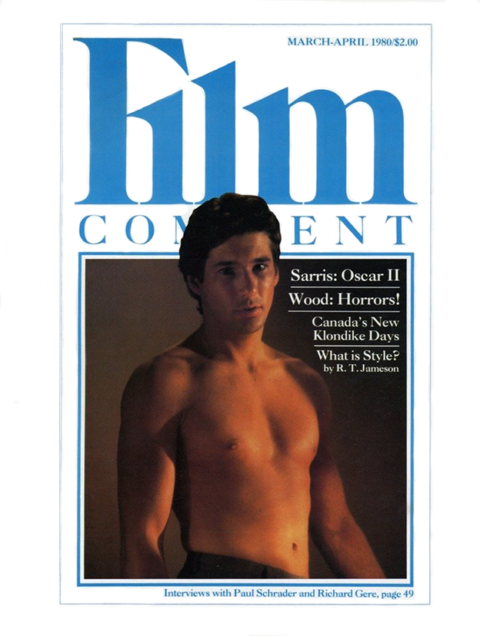By Andrew Sarris in the March-April 1980 Issue
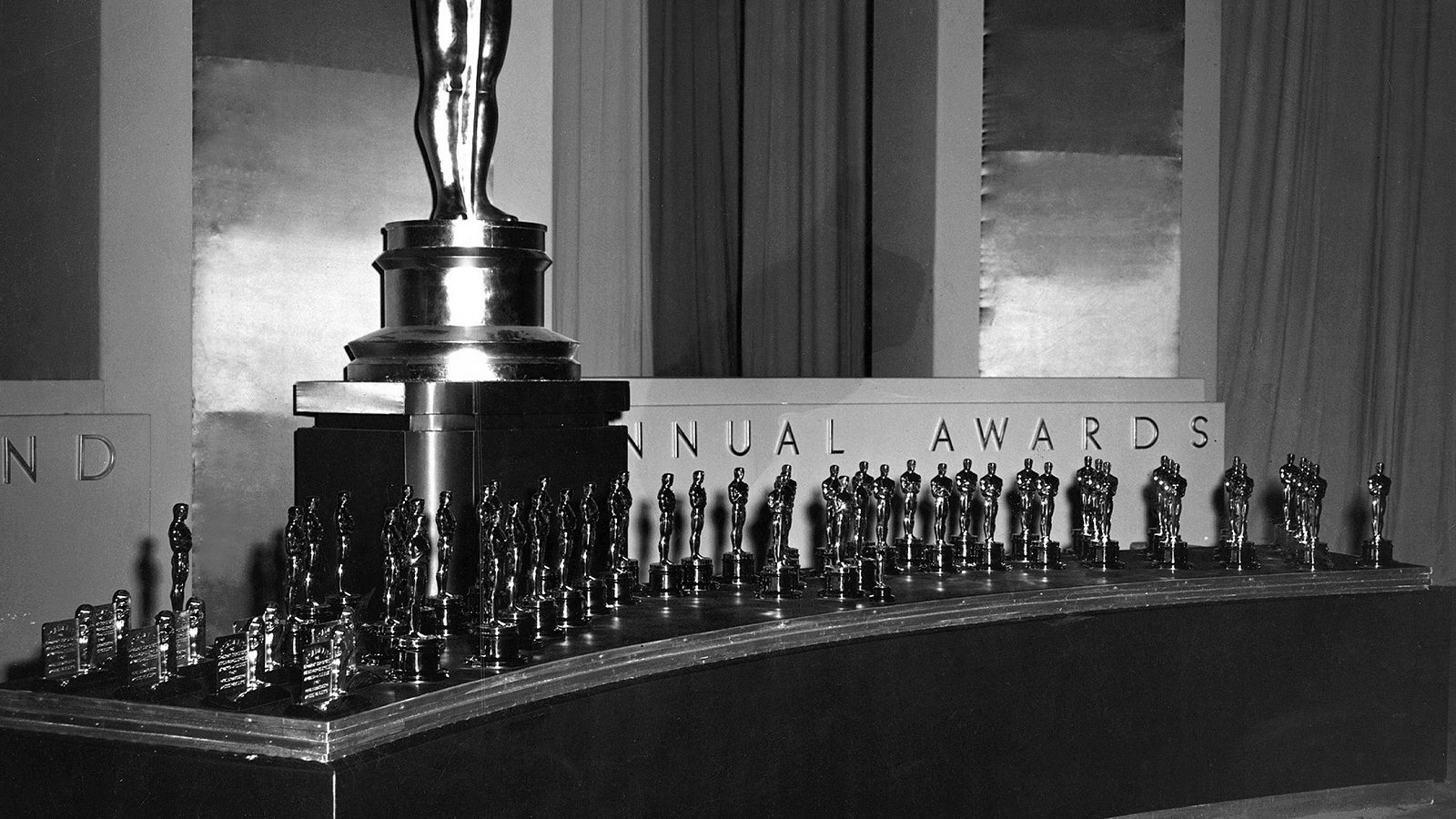
Academy Leaders
Thirty years of Oscar nights—from “Who'll win?” to “Who cares?”
To understand the nuances of Academy Award pre-selection and selection from the Fifties through the Seventies one must undertake to correlate the declining power of the studios, the rise and fall of New York Times film critic Bosley Crowther as a taste-maker on both coasts, the awe-hate relationship between Hollywood professionals and New York critics, the intermittent prestige and popularity of the foreign-language art-film, the periodic gentrification of Academy taste, and, above all, the gradual transformation of Oscar himself from a movie mascot to a reigning monarch of television tinsel.
In these contrasting contexts, the big Oscar competition among the entries of 1950 looked back more to the Forties than it looked forward to the Fifties. The major contenders that year were Joseph L. Mankiewicz’s All About Eve and Billy Wilder’s Sunset Boulevard. In the nominations, All About Eve was cited fourteen times, and Sunset Boulevard eleven.
Eve and Sunset had a great deal in common. They not only reflected the highest aesthetic aspirations of their respective studios (Twentieth Century Fox and Paramount, respectively); they both contained many Pirandellian in-jokes about the studio system itself. Although the milieu of Eve was ostensibly the Broadway theater, there were several flatteringly fearful references to Darryl F. Zanuck, who just happened to win the Irving J. Thalberg award on this occasion. By contrast, Sunset Boulevard was pure Hollywood-on-Hollywood and, in the process, much more morbid than Eve. Gloria Swanson and Erich Von Stroheim relived much of their own traumatic past along with such cameo “waxworks” as Buster Keaton, H.B. Warner, and Anna Q. Nilsson. The Paramount gate figured prominently in the proceedings, and veteran producer-director Cecil B. De Mille acted himself in a key dramatic situation.
When the gold dust had cleared at the Awards Ceremony, Eve had clearly outgunned Sunset with six Oscars (including Best Picture) to Sunset’s three. The result had been foreshadowed by the New York Film Critics, who had honored Eve, Bette Davis, and Mankiewicz along with Gregory Peck as best actor for Twelve O’Clock High. Through the Fifties, the Critics and the Academy were to agree on seven out of ten occasions on Best Picture. This was probably the one decade in which Bosley Crowther’s influence peaked on both coasts.
Eve had other advantages over Sunset. It opened a few months later, and thus enjoyed the traditional advantage of timing. Also, Eve continued a strange two-year love affair the Academy enjoyed with Joseph L. Mankiewicz. His writing and directing Oscars in 1949 for A Letter to Three Wives had been genuine surprises in both Hollywood and New York. And now, for 1950, the two towns were in agreement on Mankiewicz, for whom this was to be the last hurrah on both coasts. Sunset was more morbid and more noirish than Eve—and, given a choice, the Academy has always come down for blanc (Eve) over noir (Sunset).
The Academy had a few other surprises up its sleeve as well. Marlon Brando in The Men and Sterling Hayden in The Asphalt Jungle were ignored entirely for Best Actor, as was Gregory Peck for Twelve O’Clock High because of a difference in release dates for the film in New York (1949) and Los Angeles (1950). Instead, Jose Ferrer won for Cyrano de Bergerac over Louis Calhern in The Magnificent Yankee, William Holden in Sunset Boulevard, James Stewart in Harvey, and Spencer Tracy in Father of the Bride. One suspects that Holden was passed over on this occasion because his role was insufficiently edifying. He certainly deserved the Oscar on merit over Ferrer’s second-rate Cyrano in a fifth-rate production, but the smell of greasepaint, however rancid, has always held the Academy voters in thrall.
The Best Actress Award was even more startling. Sentiment seemed to be on the side of Gloria Swanson’s Norma Desmond, taste on the side of Bette Davis’s Margo Channing. Anne Baxter’s Eve Harrington and Eleanor Parker’s gritty female prison convict in Caged were interesting sleepers. But Judy Holliday’s reprise of her dumb blonde floozie in Born Yesterday seemed to come out of the blue for the Oscar. What was most interesting in the Ferrer-Holliday choices, however, was the political edge to the Academy’s applause. Ferrer and Holliday had both been in trouble with the Red Baiters, who were rapidly gathering force and momentum at this time. Though both Ferrer and Holliday were later “cleared” from the blacklist, they still represented liberal defiance of the super-patriots on the evening of March 29, 1951.
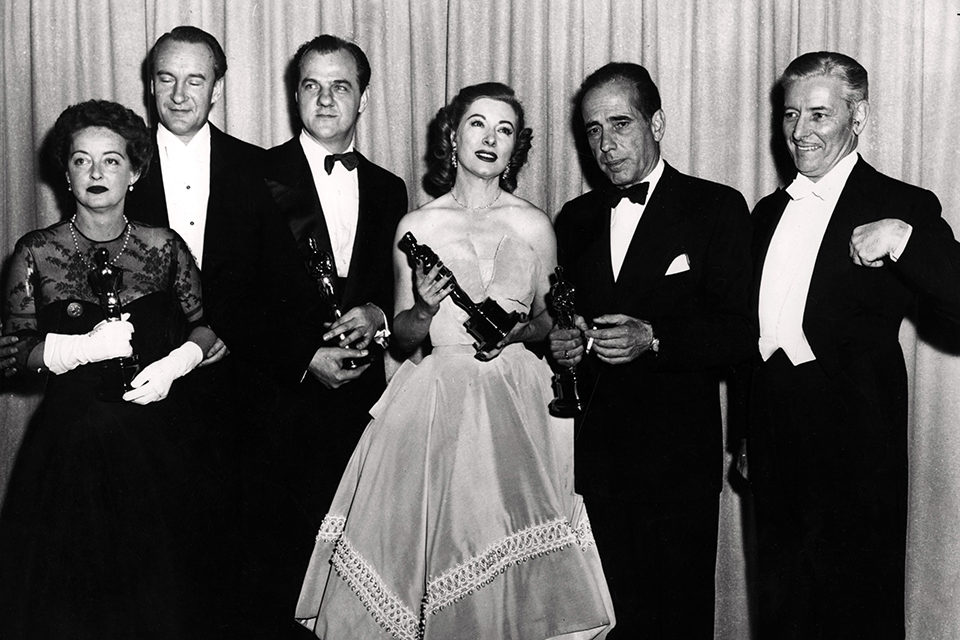
Bette Davis, George Sanders, Karl Malden, Greer Garson, Humphrey Bogart, and Ronald Colman at the 1951 Academy Awards
If the Academy ignored Marlon Brando for 1950, they managed a singular slight to his acting for 1951 by giving an Oscar to every other prominent performance in A Streetcar Named Desire, but not to his own epoch-marking histrionic explosion. The New York Film Critics led the way with the highly eccentric choice of Arthur Kennedy’s blind veteran in Bright Victory. A gimmick performance, to be sure—but if the critics were really into handicaps, why did they pass up Brando’s paraplegic in 1950? Otherwise, the Awards Ceremony seemed to start out as another two-film race, with George Stevens’ A Place in the Sun sweeping most of the technical awards and Elia Kazan’s A Streetcar Named Desire sweeping most of the acting awards (Vivien Leigh for lead, Karl Malden and Kim Hunter for support).
The suspense was building for Best Picture. Would it be Streetcar or Sun? The New York Film Critics had gone for Streetcar, Leigh, and Kazan. But the Academy passed up both black-and-white serious contenders, for a Metro color musical, An American in Paris. Again, it was blanc over noir, this time with a vengeance. It is interesting to speculate why, by even the Academy’s dubious standards, such possible Best Picture nominees as John Huston’s The African Queen, William Wyler’s Detective Story, and Lazlo Benedek’s Death of a Salesman were passed over for Quo Vadis and Decision Before Dawn. Alfred Hitchcock’s Strangers on a Train and Max Ophuls’s La Ronde, nominated for some fringe awards, were of course considered too trivial or frivolous for major consideration.
Switch-type can be cited as the reasoning behind the selection of Humphrey Bogart’s Cockney-runt characterization in The African Queen, as well as Viven Leigh’s Blanche DuBois as a striking departure from her earlier Scarlett O’Hara. Interestingly, Bogart won while his partner, Katharine Hepburn, was denied; and Leigh won while her partner, Brando, drew a blank. One might note that in the midst of McCarthyism a soon-to-be-blacklisted scenarist Michael Wilson shared the best screenplay award for A Place in the Sun with Harry Brown, and the Oscar for best motion picture story went to Seven Days to Noon, a British film with a Ban-the-Bomb theme. Still, there was already a feeling that Hollywood movies were coming unraveled as far as the Academy was concerned.
Oscar made his Television debut for the 1952 awards televised on March 19, 1953, simultaneously from the RKO Pantages Theatre in Los Angeles, and a sound stage in New York. Through the next five years the simultaneous East-West presentations were a feature of the presentations, but after five years Oscar limited his purview to Los Angeles as far as the ceremony was concerned. The first telecast of the Awards found the Academy in a splitting mood. The New York Film Critics had gone with High Noon, Ralph Richardson in Breaking the Sound Barrier, Shirley Booth in Come Back, Little Sheba, and Fred Zinnemann as best director.
The Academy followed the Critics on Shirley Booth, but tinkered a bit with the other major awards, shifting to John Ford for his direction of The Quiet Man, Gary Cooper for his performance in High Noon, and then pulling out the rug from everyone by choosing DeMille’s The Greatest Show on Earth as Best Picture. Anthony Quinn received Best Supporting Actor Award for Viva Zapata!—which gave the Academy still another opportunity to nominate Brando in the title role, and then pass him by for the Oscar. Similarly, Gloria Grahame was named Best Supporting Actress, largely for her overdone Southern accent, in Vincente Minnelli’s The Bad and the Beautiful, a movie that would loom larger in cult history than in Academy history. John Ford’s The Quiet Man and John Huston’s Moulin Rouge shared honors as the most technically innovative color films of the year; but, surprise of surprises, Jose Ferrer did not win an Oscar for his dwarfish stunt performance as Toulouse-Lautrec.
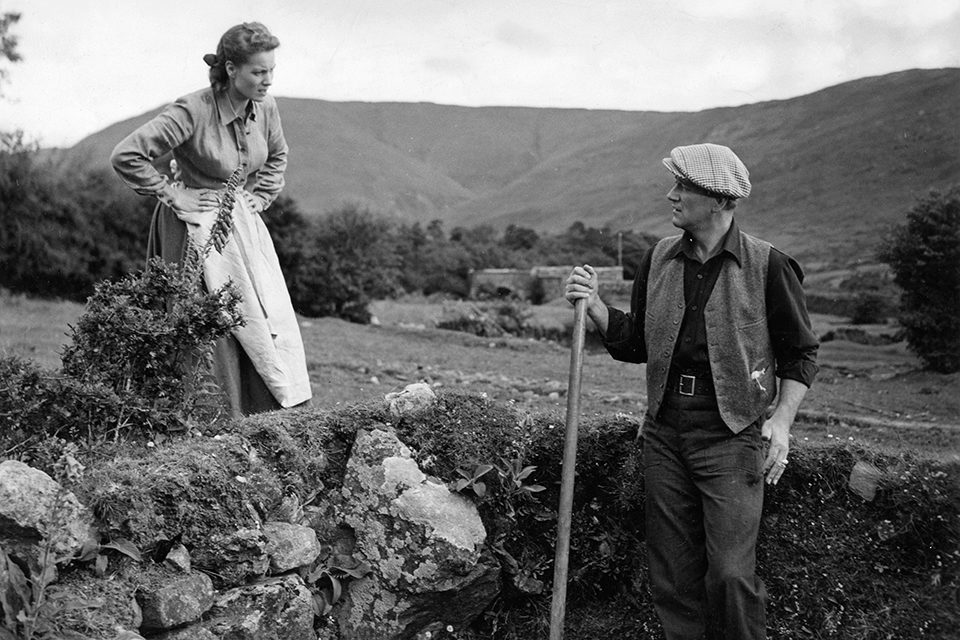
Maureen O'Hara and John Wayne in The Quiet Man (John Ford, 1952)
The one outstanding nominee for Supporting Actress was Jean Hagen in Singin’ in the Rain. This all-time-great comedy performance was far too subtle for an Academy tradition that was oriented to the obvious and the overblown. The same can be said for the slighting of performances as charming as Danielle Darrieux’s in Five Fingers, Joan Greenwood’s in The Man in the White Suit, and Wendy Hiller’s in Outcast of the Islands. For that matter, why were John Wayne and Maureen O’Hara completely ignored in The Quiet Man, and Ralph Richardson and Trevor Howard in Outcast of the Islands, not to mention Charles Chaplin and Claire Bloom in Limelight? Indeed, it was in 1952 that my own critical sensibility emerged from its cocoon to view the Oscars with ever-increasing disdain, and I have never taken them very seriously since as indicators of good taste. Fortunately, television revivals of old movies enabled me to reappraise the full contexts of the Oscars of the Thirties and the Forties.
My own feeling through the rest of the Fifties was that the Academy membership was becoming less movie-conscious and more property-conscious. With the help of Bosley Crowther and the New York Film Critics, they were seeking one single sweep film that would sum up their meager year. In 1953 it was Fred Zinnemann’s From Here to Eternity; in 1954 it was Elia Kazan’s On the Waterfront, with a politically provocative script by Budd Schulberg, and a finally Oscar-worthy performance by Marlon Brando; in 1955 it was Delbert Mann’s Marty, with its classic Philco Playhouse script by Paddy Chayevsky; in 1956 it was Michael Anderson’s Around the World in 80 Days, with most of the publicity cleverly focused on producer Michael Todd and scenarist S.J. Perelman; in 1957 it was David Lean’s Bridge on the River Kwai; and in 1959 it was William Wyler’s Ben Hur. Only in 1958 did the Critics and the Academy diverge with the Critics embracing Stanley Kramer’s flatfooted interracial allegory, The Defiant Ones, and the Academy going gaga instead over Vincente Minnelli’s Gigi with its original Lerner and Loewe score. Through this decade the hegemony of taste between New York and Hollywood seemed complete.
As a critic, I never agreed with any of the Best Picture decisions—though I could live with the choices of William Holden in Stalag 17 and Audrey Hepburn in Roman Holiday (1953), and with Brando in On the Waterfront, Edmond O’Brien in The Barefoot Contessa even over Rod Steiger in On the Waterfront, and Eva Marie Saint in Waterfront (1954), though she was a ringer as Best Supporting Actress. Anna Magnani in The Rose Tattoo (1955), Dorothy Malone in Written on the Wind (1956), Susan Hayward in I Want To Live (1958), and Simone Signoret in Room at the Top in 1959 seemed reasonably discerning choices.
The Academy could not be charged with heart-warming sentimentality for 1954 when it passed up Judy Garland’s emotionally wrenching performance in A Star Is Born for the cool frumpiness of Grace Kelly in The Country Girl. To pick Ernest Borgnine’s pedestrian performance in Marty over James Dean’s electrifying portrayals in East of Eden and Rebel Without a Cause might not have been possible even for the increasingly senile Academy if they had not received sanction from Bosley Crowther’s dismissal of Dean as a Brando imitator. And to compound the critical felony the following year—by choosing Yul Brynner’s charade performance in The King and I over both Laurence Olivier’s Richard III and James Dean’s oil tycoon in Giant—was to alienate my sympathies for all time. The Academy officially resurrected Ingrid Bergman by honoring her performance in Anastasia, but only after the New York film critics had taken the lead. Certain prejudicial patterns began to develop. Deborah Kerr and Richard Burton were never to be honored with an Oscar no matter how many times they would be nominated—but for some reason Elizabeth Taylor would become Oscar’s pet at the slightest provocation.
Through the Sixties the only acceptable Best Picture choice was Billy Wilder’s The Apartment in 1960. I would have opted for Alfred Hitchcock’s Psycho, but that had about as much chance with the hidebound anti-noir Academy as John Ford’s The Searchers, Alfred Hitchcock’s Vertigo, and Orson Welles’ Touch of Evil would have had in the Fifties. I could at least sit through West Side Story in 1961 and Midnight Cowboy in 1969, though I was not overwhelmed by either film. I was bored by Lawrence of Arabia, unamused by Tom Jones, mildly disappointed by My Fair Lady, ashamedly (and, ultimately, diabetically) diverted by The Sound of Music, excruciatingly edified by A Man for All Seasons, belabored by the obvious with In the Heat of the Night, and utterly stupefied by Oliver!
My own tastes ran to such pariah pictures as Breathless, Breakfast at Tiffany’s, Viridiana, L’Avventura, The Man Who Shot Liberty Valance, A Hard Day’s Night, Shot in the Dark, The Birds, Contempt, Bunny Lake Is Missing, Blowup, Belle de Jour, Petulia, Faces, and My Night at Maud’s. About the only acceptable acting awards of the decade were Anne Bancroft’s and Patty Duke’s in The Miracle Worker (1962), and Patricia Neal’s long overdue award for a nothing part in Hud (1963), Julie Christie’s in Darling and Martin Balsam’s in A Thousand Clowns (1965), Walter Matthau’s in The Fortune Cookie (1966), and Jane Fonda’s and Gig Young’s They Shoot Horses, Don’t They? (1969).
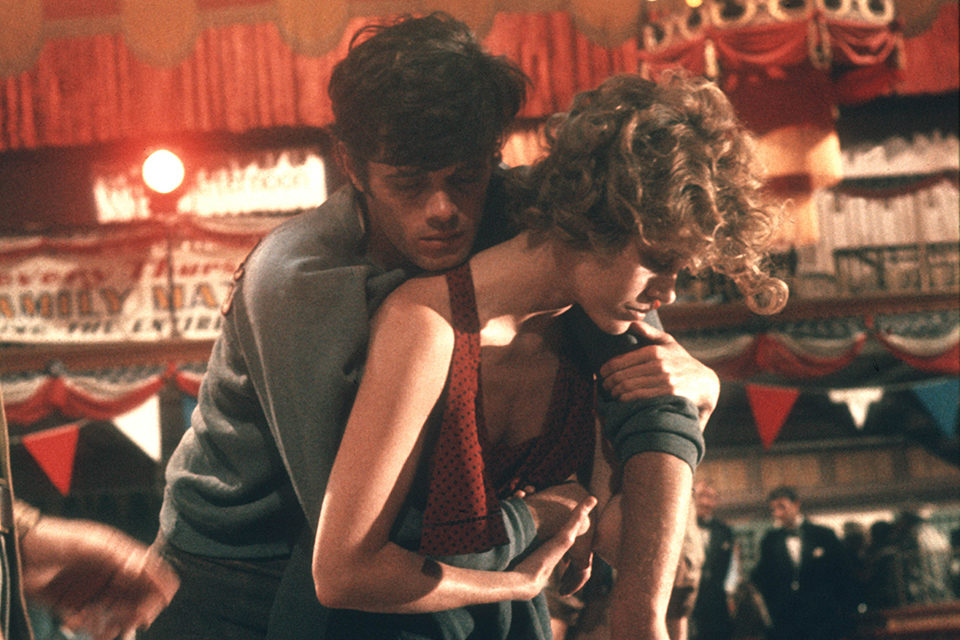
Michael Sarrazin and Jane Fonda in They Shoot Horses, Don't They? (Sydney Pollack, 1969)
In 1966 I began to vote for my own awards as a member of the National Society of Film Critics, and in 1968 I became a member also of the New York Film Critics. Bosley Crowther had been replaced by Renata Adler the year before, after twenty-seven years of service and influence. The New York Film Critics voted a special citation to Crowther in 1967 for his unusually long and respected tour of duty. For a time the New York Film Critics went on an arty kick, and became temporarily alienated from the Academy. Antonioni, Bergman, Bunuel, Rohmer, Truffaut, Costa-Gavras, Kubrick, and Altman could win for Best Picture; but Hollywood almost invariably had different ideas, going with Patton in 1970 over both M*A*S*H and Five Easy Pieces. (The Academy could have done much worse, since its other two nominees were Airport and Love Story.)
In 1971 The French Connection prevailed over A Clockwork Orange, another triumph for crass commerce over anguished artiness. But in 1972 The Godfather cut both ways as commerce and as art. In 1973 the Academy overruled New York’s infatuation with Cries and Whispers by substituting The Sting. In 1974 The Academy overcame its traditional resistance to sequelitis by honoring The Godfather, Part II—if anything, artier and more self-consciously meditative than the original. In 1975 the Academy vetoed New York’s endorsement of Nashville by lining up behind the artistically respectable One Flew Over the Cuckoo’s Nest. 1976 saw the pure corn of Rocky prevail over more New Yorkish-cerebral entertainments like All the President’s Men, Network, Taxi Driver, and Bound for Glory. In 1977 and 1978 New York and Hollywood found themselves in virtual agreement on Annie Hall and The Deer Hunter respectively. But it is not quite clear whether the East was getting more practical or the West more poetical.
In my increasingly professional crankiness I found myself mollified by such Oscar winning performances as George C. Scott’s in Patton (1970), Gene Hackman’s in The French Connection (though I much preferred Peter Finch’s in Sunday, Bloody Sunday), Jane Fonda’s in Klute, Ben Johnson’s and Cloris Leachman’s in The Last Picture Show (1971), Robert DeNiro’s in The Godfather, Part II (1974), Jack Nicholson’s and Louise Fletcher’s in One Flew Over the Cuckoo’s Nest and Lee Grant’s in Shampoo (1975), Faye Dunaway’s in Network and Jason Robards, Jr.’s in All the President’s Men (1976), Diane Keaton’s in Annie Hall (1977), and Maggie Smith’s in California Suite, and either Jill Clayburgh’s in An Unmarried Woman or Jane Fonda’s—which was it?—in Coming Home (1978).
My uncertainty about last year is typical of my growing habit of blocking out the most recent Oscar ceremonies. I can remember the winners and nominees of thirty and forty years ago more clearly than I can remember the most recent choices. I am more conscious these days of random hype than of any systematic pattern. For the most part, the industry does not make nearly enough movies to make the competition either interesting or suspenseful. Furthermore, television, which has made the Oscarcast so widely viewed, is also responsible for keeping people away from most movies. The result is that most viewers are less critical of the Oscar choices than they should be. Instead, they often use the Oscarcast as a certification of the movies they are obliged to catch up on in their increasingly infrequent moviegoing.
My perpetual complaint with the Academy is that most of its members neither like nor respect movies sufficiently to bother refining their taste. Still, I have become increasingly aware in recent years that I am no longer exactly an innocent bystander in the process, and, indeed, that I have become a part of the very pattern I profess to deplore. For a time I tried to play a tactical role by throwing my weight on occasion to the lesser evil rather than to the greatest, if loneliest, good. Though I shall always be tempted to win with Sally Field rather than lose with Hanna Schygulla, my tendency as I have gotten older is to honor my own individual tastes at the expense of my collectively oriented tactics.
The Oscars shall remain a sporting proposition, but nothing more. The studio odds no longer pertain because there are no longer any functioning studios with any genuine pride in their product. And there is no longer any Bosley Crowther to harmonize the tastes of East and West Coasts. Discord and disagreement loom far into the foreseeable future, and my only long-range hope is that all the squabbling may eventually stimulate creativity.



